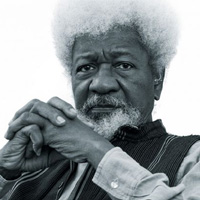Wole Soyinka - Biography and Works
Wole Soyinka, whose real name is Akinwande Oluwole Babatunde Soyinka, was born in a Yoruba family in West Nigeria in 1934. He is a well-known playwright, novelist, essayist and poet whose literary excellence was awarded in 1986 when he was rewarded with the Nobel Prize in Literature. He became the first African to receive this award in that category.

Wole Soyinka (Born in 1934)
Soyinka went to Government College, University College in Ibadan and graduated from the University of Leeds in England in 1958. He worked with Royal Court Theatre in London and wrote plays that were published in both London and Nigeria. When returning to Nigeria, he established an acting company and wrote his first play A Dance of the Forests published in 1963 though written in 1960. His plays are praiseworthy for the skilful fusion of the western elements with the subject matter and the technique related to the Yoruba religion and tradition. He uses symbolism, flashback technique, irony, satire and language according to the character so as to make his plays outstanding. He went on writing more plays that satirized the westernized school teachers in The Lion and the Jewel and mocked the preachers of the churches in The Trials of Brother Jero. His other plays are The Strong Breed (1963), Kongi’s Harvest (1967), The Road (1965), From Zia, with Love (1992), King Baabu (2002). His plays show his anger towards the African dictatorial leaders and the ignorant people of Nigeria. His other remarkable plays are Madmen and Specialists, Death and the King’s Horseman (1975), and The Beatification of Area Boy (1995).
He worked as the coeditor of Black Orpheus for five years, which was one of the most important literary journal. He ran theatre groups in many universities and became the visiting professor after receiving the Nobel Prize. He is also famous for the novels; The Interpreters (1965) and Season of Anomy (1973). His skill in poetry can be best known by the best poems he penned like; Idanre, and Other Poems (1967) and Poems from Prison (1969; republished as A Shuttle in the Crypt, 1972), Early Poems (1998); Mandela’s Earth and Other Poems (1988); and Samarkand and Other Markets I Have Known (2002).
His collection of essays Myth, Literature, and the African World (1976) is one of the best critical work in which he praises the Yoruba myth and symbolism. Art, Dialogue, and Outrage (1988) is another notable essay where the art, culture and society of Yoruba tribe is admired. The Open Sore of a Continent (1996) and The Burden of Memory, the Muse of Forgiveness (1999) are his other outstanding works in the essay.
Soyinka is not only a literary figure but also a political activist. He took active participation in Nigeria’s independence from Great Britain. In 1967 during the Civil War of Nigeria he was arrested and kept in confinement in his own home for two years. He criticized the military dictatorship of Mugabe and Zimbabwe regime. He was given a death sentence by General Sani Abacha which was later lifted. He is the chairman of the Democratic Front for a People’s Federation party that he founded in 2010.
He was awarded the Europe Theatre Prize in 2017 for his especial contribution to the realization of cultural exchange program between people of different nations and identities.
